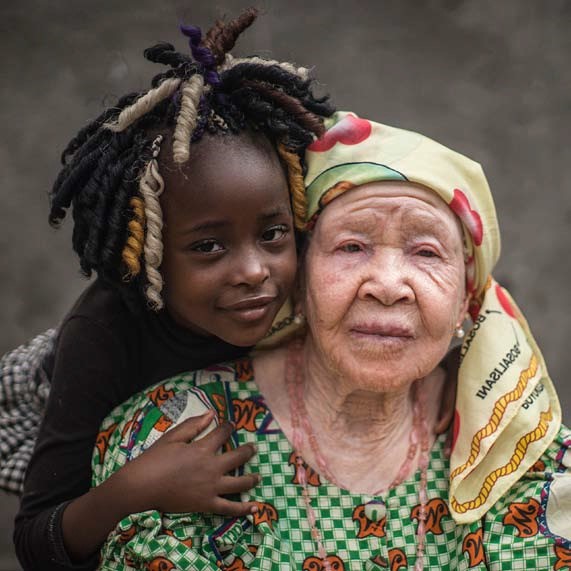Women Impacted by Albinism
Women impacted by albinism – including women with albinism and mothers of children with albinism – face layered oppressions, both gender-based and due to their identity as people with albinism. They are often abandoned by their spouses due to the stigma surrounding albinism, blamed for having a child with albinism, endure discrimination in healthcare, and experience acute vulnerability to ritual attacks and rape, based on the belief that having sex with a woman with albinism cures HIV/AIDS. Ensuing economic challenges and workforce barriers keep women impacted by albinism in cycles of poverty and social exclusion. Despite this dire situation, there has been an alarming dearth of advocacy specifically targeting the unique challenges faced by women with albinism.

Intersection of Oppression: Women with albinism are at the crossroads of multiple layers of discrimination. The duality of their identity—being a woman and a person with albinism—places them in a unique sphere of oppression. (Sources: UN Expert on Women; Ero I. et al; Mothering & Albinism).
Healthcare Discrimination: Their rights to sexual and reproductive health services are often denied or compromised due to stigma and harmful practices against people with albinism and their family members.
Ritualistic Violence: Myths deeply ingrained in certain cultures lead to ritual attacks, including murder and maiming of the limbs of persons with albinism based on the misconception that their body parts, when used in witchcraft, can bring prosperity.
Dangerous Misconceptions: A sinister belief prevails in some communities that intercourse with a woman with albinism can cure HIV/AIDS, leading to rapes, single-motherhood, and sexually transmitted infections.
Societal and Economic Disparities: Women impacted by albinism frequently face abandonment by their male partners after the birth of a child with albinism, or due to unrelenting stigma. This familial desertion, combined with discrimination in the job market, causes acute economic hardships for women impacted by albinism.
Empowering women impacted by albinism: The AAN’s 2022 survey revealed that only 16% of albinism organizations focus on female beneficiaries, and women with albinism are all but absent from leadership positions in civil society organizations. Unsurprisingly, their specific issues are rarely highlighted in advocacy spaces and their voice in civic participation is nearly non-existent.
AAN’s Proactive Response
Training and Capacity Development: AAN is developing targeted efforts to elevate the voices, develop the advocacy skills and leadership qualities of women impacted by albinism. Our approach includes developing a cohort mentoring model through which women impacted by albinism convene to discuss issues, develop advocacy positions, and build leadership skills.
Building Bridges: We are working to build bridges with women’s rights organizations so that the concerns of women impacted by albinism receive greater visibility, are included in more mainstream advocacy platforms, and women’s rights movements become more inclusive.
Advocacy Efforts: AAN has relentlessly advocated for the rights of women impacted by albinism. Engagements with key international bodies like the AU and UN have been consistent since AAN’s inception, especially with the UN Committee on the Elimination of Discrimination Against Women (CEDAW). Our various submissions to the CEDAW Committee on women impacted by albinism resulted in 3 recommendations to the government of Malawi. We are supporting on-the-ground advocates to press for implementation of these recommendations.”
Empirical Research: Behind nearly every successful person with albinism is a mother whose resilience and support ensured the future of their child. It is for this reason that AAN is a co-lead in a multi-year project dedicated to gathering reliable data from women impacted by albinism. This multi-sectoral research collaborative is amassing knowledge to inform policy and advocacy initiatives to improve the wellbeing of women impacted by albinism. While this research is generating valuable empirical data, policy and advocacy initiatives have been limited due to insufficient resources.
Opportunity
The next chapter in this fight is clear: women impacted by albinism must receive targeted training and support to elevate their voices and ensure their issues are addressed in policy advocacy on the rights of people with albinism. They also need access to spaces where women’s rights issues are discussed, and together with broad-based women’s rights movements and feminist groups, must bring the struggles of women with albinism to the forefront. By integrating their issues into broader women’s rights discourse, we can ensure that women impacted by albinism receive the visibility they deserve as human rights leaders, and unite across movements to implement the recommendations informed by their voices.
Resources
- AAN’s Report on the Situation of Women with albinism in Malawi submitted to the UN
- Report from the UN Expert on women impacted by albinism
- Report from the UN Expert on albinism and the right to health
- Watch: The right to health for persons with albinism
- Mothering & Albinism – a multisectoral research, advocacy and policy project co-led by AAN
- Watch: Women and children impacted by albinism